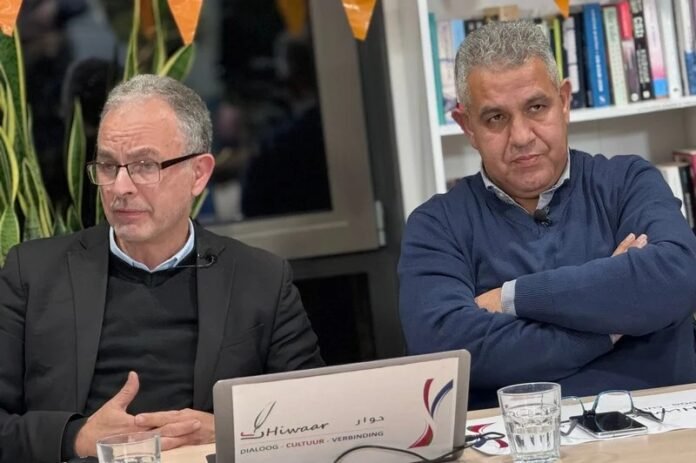Does “Hiwar’s” apology about Moroccans in the Netherlands reflect reality or ignorance?
During a roundtable discussion recently organized by the Hiwar Foundation in the Netherlands, Qassem Ashhaboun offered an apology on behalf of Moroccans living in the Netherlands, expressing regret for the community’s lack of full integration into Dutch society. While his remarks seemed to attempt to explain recent events in Amsterdam, particularly the clashes between Moroccan youth and supporters of an Israeli team, his statements raise contradictions and questions.
The contradiction in the apology: Are Moroccans victims or responsible?
On one hand, Ashhaboun highlights the marginalization and racial discrimination suffered by the Moroccan community in the Netherlands, pointing out the lack of full integration despite significant contributions by Moroccans to modern Dutch society. This position seems logical in the context of the debate that emerged after the recent events in Amsterdam, where some Dutch political circles linked violence and lack of integration to the younger Moroccan generation.
On the other hand, Ashhaboun’s statements contradict the reality experienced by many members of the Moroccan community in the Netherlands, who wonder why they haven’t been given genuine opportunities to thrive, particularly in education and employment, while facing racism in the Dutch market. Is the issue of these youth solely due to neglect by Dutch society, or does the Moroccan community itself bear some responsibility for failing to achieve effective integration?
Moroccan contributions or ongoing marginalization?
Ashhaboun mentioned in his speech the significant role played by Moroccans in building modern-day Netherlands, citing Moroccan soldiers who fought in World War II and the sacrifices of previous generations of Moroccan workers. But does this mean the current generation of Moroccans in the Netherlands is viewed in the same light? Do their contributions in economics and politics carry the same value as historical ones? Or does the lived reality, reflecting discrimination and marginalization, tell a different story?
If the Moroccan community has made genuine contributions to the Netherlands, what prevents these efforts from being truly appreciated? Is it institutional neglect toward Moroccans, or are there cultural and social factors hindering this community’s progress?
Events in Amsterdam: More than just sports-related violence
The incidents in Amsterdam were not merely about sports-related violence but were an extension of a deeper conflict. These events revealed the political and social tensions within the Netherlands, where anti-Arab and anti-Muslim rhetoric heightened provocations during the match. Here, a question arises: Was this violence simply a reaction to repeated provocations? Was it a direct consequence of how the Moroccan community is treated in the Netherlands, or do other factors such as poverty and unemployment play a major role in these tensions?
The media: A tool for tension or a means of awareness?
Criticizing the role of Dutch media, Ashhaboun condemned its biased coverage and stereotypes about Arabs and Muslims, which fueled the situation. This criticism raises a question, especially when considering alternative media outlets that offered more balanced analyses. But are Dutch media alone responsible for this stereotypical image? Shouldn’t the Moroccan community have worked harder to promote a positive image of itself through media and social activities?
What’s the solution?
While Ashhaboun continues to emphasize the contributions of Moroccans to the Netherlands and calls for their recognition, the most important question remains: How can the Moroccan community truly integrate into Dutch society? Is an apology enough to change the situation? Or does the community need practical actions to strengthen its presence in Dutch society effectively and sustainably, beyond occasional statements?
Are we stuck in a vicious cycle of endless debates, or is it time to propose real solutions?


